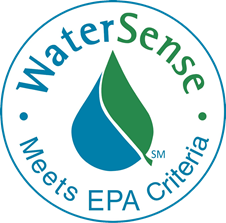There are many benefits to using water efficiently, including improved water quality, less impact on the environment and conserving water resources. Through the use of water-efficient products, you may save on your water and energy bills. Below are other conservation ideas from the U.S. Environmental Protection Agency (EPA).
Conserving Water at Home
You can conserve water by repairing leaking indoor and outdoor faucets and replacing old fixtures and appliances like toilets, washing machines and dishwashers. And, when purchasing appliances or products, look for the WaterSense label, which means the product meets the EPA’s water efficiency standards.

Kitchen
- When cooking, peel and clean vegetables in a large bowl of water instead of under running water.
- Fill your sink or basin when washing and rinsing dishes.
- Only run the dishwasher when it's full.
- When buying a dishwasher, select one with a light-wash option.
- Only use the garbage disposal when necessary. Composting is a great alternative.
- Install faucet aerators.
Laundry
- Only run full loads of laundry.
- When purchasing a new washing machine, buy a water-saving model that can be adjusted to the load size.
Bathroom
- Take short showers instead of baths.
- Turn off the water to brush teeth, shave and soap up in the shower.
- Fill the sink to shave.
- Repair leaky toilets. To determine if you have a leak, add 12 drops of food coloring into the tank. If color appears in the bowl one hour later, your toilet is leaking.
- Install a toilet dam, faucet aerators and low-flow showerheads.
Conserve Water at Your Business
Businesses vary tremendously in their water needs depending on the products or services that they provide. EPA's pollution prevention program offers assistance to businesses on ways to reduce water use through their manufacturing processing. Visit the EPA Region 5 website to learn more.
Other ways businesses can conserve water include:
- Outfitting restroom and break room faucets with low-flow restrictors.
- Getting a water audit to examine how much water you use and receive detailed information on opportunities for using less (and saving money).
- Purchasing water-efficient equipment. Though they may be more expensive, they may pay for themselves quickly through water and water-heating energy savings.
- Reducing landscape water use (see below).
- Engaging and informing employees and customers with water conservation tips.
Conserve Water Outside
Businesses and residences can use most of their water outdoors, especially during the summer. Below are some tips to cut down on water use.
- Consider planting more trees, shrubs, ground covers, and less grass.
- Plant items that require regular watering close together.
- When mowing your lawn, set the mower blades to 2-3 inches high to encourage moisture retention and a deeper root system.
- Only water the lawn when necessary.
- Avoid watering on windy and hot days, or water the lawn and garden in the morning or late in the evening to maximize the amount of water that reaches the plant roots.
- Apply mulch around shrubs and flower beds to reduce evaporation, promote plant growth and control weeds.
- Add compost or an organic matter to soil as necessary, to improve soil conditions and water retention.
- Collect rainfall for irrigation in a screened container (to prevent mosquito larvae growth).
- When washing a car, wet it quickly, then use a bucket of water to wash the car. Turn on the hose for the final rinse.
- Use a broom instead of your hose to clean walkways, driveways, decks and porches.
- If you have a pool, use a cover to reduce evaporation when the pool is not being used.
Relevant Links
